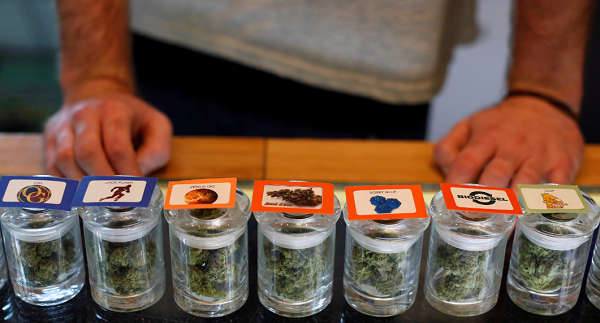
From earthy-flavored OG Kush to zesty Lemon Haze and skunky Sour Disel, there's a plethora of flavor options for marijuana smokers in legal states to choose from when purchasing weed at their local dispensaries. Now researchers have identified the genes that give cannabis plants their differing tastes.
Scientists at the University of British Columbia (UBC) recently discovered about 30 different molecules responsible for marijuana's flavor, called terpene synthases genes. In the marijuana industry, the components that make up cannabis' distinct smell and taste are often referred to as simply terpenes.
UBC researchers said the specific terpene synthases genes found in cannabis are very similar to the molecules found in grapevines that give wine its flavor. Along with the gene that produces marijuana's main terpene—beta-caryophyllene—researchers discovered three groups of terpenes that produce limonene, myrcene and pinene.
"The limonene compound produces a lemon-like flavor and myrcene produces the dank, earthy flavor characteristic of purple kush," Judith Booth, one of the study's authors and a graduate student at UBC said in a statement. The study was released in the journal PLOS One Wednesday.
Jörg Bohlmann, a professor in the Michael Smith Laboratories and faculty of forestry at UBC who also worked on the study, said the research could help cultivators determine which genes to "pay attention to for specific flavor qualities."
"The goal is to develop well-defined and highly-reproducible cannabis varieties. This is similar to the wine industry, which depends on defined varieties such as chardonnay or merlot for high-value products," Bohlmann said.
The research comes just days after Oxford University launched its new Oxford Cannabinoid Technologies company, which aims to conduct a series of studies on the cellular and molecular components of marijuana's cannabinoids—one of the chemical compounds found in the plant often used to treat certain medical conditions.
Uncommon Knowledge
Newsweek is committed to challenging conventional wisdom and finding connections in the search for common ground.
Newsweek is committed to challenging conventional wisdom and finding connections in the search for common ground.
About the writer
Michigan native, Janice Williams is a graduate of Oakland University where she studied journalism and communication. Upon relocating to New ... Read more
To read how Newsweek uses AI as a newsroom tool, Click here.








